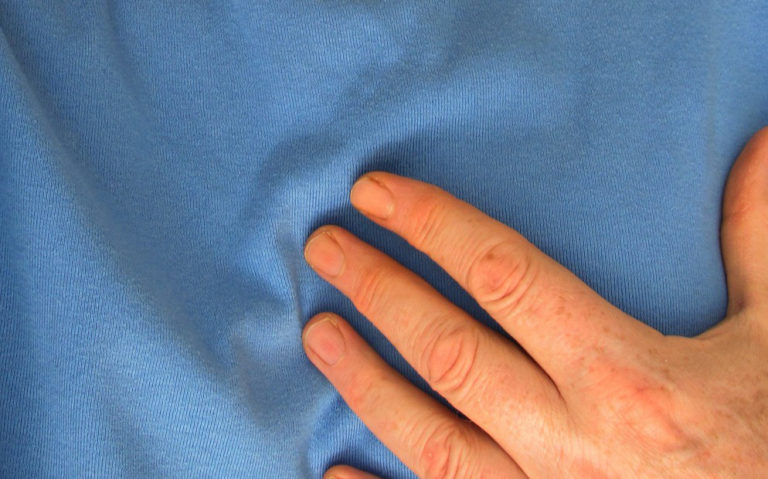
Chest pain is an important symptom to recognize because chest pain can be a sign of heart attack. And while having chest pain does not necessarily mean you are having a heart attack, and in fact, most people who go to the emergency room with chest pain are not having a heart attack, chest pain is nevertheless not something to ignore.
Indeed, chest pain can be caused by any of a number of factors, including:
- Inflammation or infection of the lining or covering of the heart
- Chest wall muscle soreness
- Involvement of the ribs or joints, such as arthritis
- Shingles (herpes zoster), or pinching of nerves in the neck, back or chest
- Injury to the chest, including surgery
- Digestive problems such as heartburn, acid reflux, stomach ulcers, or irritable bowel syndrome
- Problems affecting the lungs, such as pneumonia or blood clots in the lungs.
- Psychological problems, such as panic disorder or depression
- Tear of the lining of the big blood vessel in the chest (called the aorta)
Chest pain caused by any of these factors should be checked out by a doctor.
What Are The Typical Symptoms of Heart Attack?
Typical symptoms of a heart attack include chest pressure, tightness, heaviness or discomfort in the center of the chest often with radiation to other parts of the upper body, including the arms, back, neck, jaw, or stomach. The classic description is of an ‘elephant sitting on the chest’ sensation. These symptoms are often associated with:
- Shortness of breath
- Nausea, vomiting, burping, or heartburn
- Sweating or having cold, clammy skin
- Feeling dizzy or lightheaded or even fainting
Not Everyone Feels the Same Thing
While these are “typical” symptoms, please note that women and people with diabetes often do not list chest pressure as a symptom they experienced when having a heart attack. They often describe symptoms such as tooth pain or pain in the hands.
If you believe you are having a heart attack, do not try to get to the hospital on your own. Call an ambulance. People often delay seeking help for a heart attack because they think the symptoms are not serious or will go away. When they do that, they risk permanent damage to their heart – or even death. Hence, timing if crucial and critical, to recognize early, so that diagnosis and treatment can be started early to save damage to the heart and to save your life. Every second counts when it comes to keeping your heart muscle alive! As cardiologists say, “Time is muscle!”
Call for an ambulance if the pain:
- Is new or severe
- Happens along with shortness of breath
- Lasts more than a few minutes
- Gets worse when you walk, climb stairs, or do other types of physical activity
What are the tests for causes of chest pain?
Though the cause of chest pain is not always easy to find, heart attack is the most important and urgent cause of chest pain. Doctors will perform any of a number of tests to determine if your heart is in trouble. These tests may include:
- An electrocardiogram (ECG or EKG) – This test measures the electrical activity in your heart. It can help doctors find out if you are having a heart attack.
- Blood tests – During a heart attack, the heart releases certain chemicals (eg troponin or CK-MB). If these chemicals are in your blood, it might mean you are having a heart attack.
- Cardiac catheterization (also called “cardiac cath”) – During this invasive test, the doctor puts a thin tube into a blood vessel in your leg or arm and directs it to your heart to inject a special dye and take images of the arteries under X-ray. This part of the test is called “coronary angiography.” It can show whether any of the arteries in your heart are narrowed or completely blocked.
Based on the above tests, if the doctor suspects you are not having a heart attack, he or she may order other tests such as a stress test (to detect blockages in your heart), CT scan or other X-rays of the chest or ultrasound of the belly to better understand the cause of the pain. These tests, of course, aren’t quite as urgent as those for heart attack.
But with any suspected heart problems, it’s important that you see a doctor for proper diagnosis.